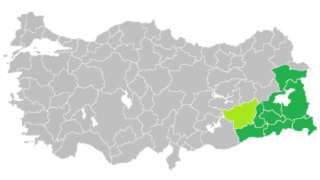Bakur
Northern KurdistanIn the southeast of Turkey lies Bakur (“north” in Kurdish). The largest Kurdish population lives here. Their precise number is unknown, but estimates are around 20 million, almost a quarter of Turkey’s total population.
The Kurds live mainly in the southeast of the country, but several wars forced migrations and the destruction of thousands of Kurdish villages, causing many Kurds to move to the west of the country, especially to the capital Istanbul.
When the Allies divided the Ottoman Empire after WWI, they had promised the Kurds their own state (Treaty of Sèvres, 1920). However, an insurrection broke out in Ankara under the leadership of Mustafa Kemal, who later became known as “Atatürk” or “father of Turkey.” Eventually the conflict ended with a new treaty (the Treaty of Lausanne, 1923) that was much more beneficial to the new Turkish state, founded from what was left of the Ottoman Empire. In this new treaty there was no room for a separate Kurdish state. And so the Allies assigned the largest part of Kurdistan (Bakur) to Turkey.
Atatürk made Turkey a secular and modern state, but at the same time based it on ultra-nationalistic reads. In Turkey, there was only room for one people, the Turks, one religion, Sunni Islam, and only one language, Turkish. Other ethnic religious groups were discriminated against and prosecuted. For example, the Turkish state did not recognize Kurds and Arameans (Assyrian Christians), but regarded them as Turks. Until the 1980s, the Turkish authorities called the Kurds “mountain-Turks”. The Kurdish population was forced to assimilate by military force through compulsory education in Turkish and through a ban on the use of Kurdish in public life. Kurdish names of places were changed to Turkish and parents were forced to give their newborn children a Turkish name instead of a Kurdish one, which explains why many Kurds have two names: an official Turkish and a “real” Kurdish name.
Against this oppression, rebellions broke out regularly, but were always beaten bloodily. Turkish forces committed various mass killings (eg Zilan, 1930). This history of forced assimilation, rebellions, oppression and bloodshed continues today.
In 1984 the Workers Party of Kurdistan (PKK) started an armed guerrilla war against the then military dictatorship. Since then there have been various peace processes. Attempts to defend the basic rights of the Kurdish people who have fallen behind by democratic means have, until now, consistently ended with the arrest of elected politicians and a ban on Kurdish political parties.
When the Peoples’ Democratic Party (HDP) – one of the may pro-Kurdish political party trying to change anything through the elections – succeeded in breaking through electorally in 2014, President Erdoğan pulled the plug on the peace process with the PKK. After all, the HDP had announced that they would not go along with Erdoğan’s ambitions to introduce a presidential system with more power for the president. Erdoğan then withdrew the war card hoping to push the HDP back under the 10% electoral threshold. When the peace process was literally blown to pieces later (bombing in Suruç), several Kurdish cities in southeastern Turkey proclaimed independence. Encouraged by the success of the Kurdish militias in Syria, armed young people set up barricades in the neighborhoods. Erdoğan sent tanks to the rebellious Kurdish cities who were literally razed to the ground in 2015-2016. The Turkish forces committed the most barbaric crimes against the civilian population . More than half a million people lost their homes.
After the “attempted coup” of July 15, 2016, President Erdoğan seized all power and repression increased again. The HDP saw its members of parliament disappear behind bars and the local Kurdish mayors were relieved of their duties and replaced by government pawns. Anyone who dares to criticize the Turkish regime has since been a under threat …
The Kurdish Institute started the campaign #SOSTurkey to protest the repression in Turkey.



